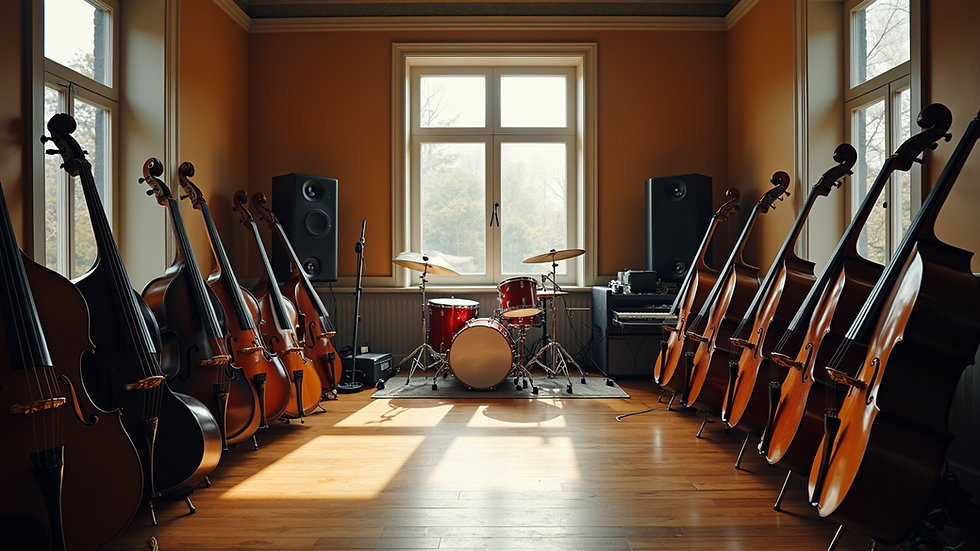How Music Shapes Minds and Boosts Creativity
- Christie Dittmer

- Aug 8, 2025
- 4 min read
If you know anything about me, you know my list of reasons for including music education in your homeschool would be earnest and long! There really are so many benefits. But today, we're going to home in on a couple of specific impacts music learning has on us.
Music is so much more than an art form; it is a powerful force that shapes our minds and fosters creativity. It connects us with our emotions and enhances our cognitive abilities.
Let's dive in to how music influences our brain and how it can help us unlock our creative potential and improve our overall well-being.
Music Creativity and Its Impact on Brain Development
When we engage with music, whether by listening or creating, multiple areas of our brain are activated. Studies show that music activates the auditory cortex, the motor cortex, and regions responsible for emotion and memory. This intricate, multi-faceted response encourages neural connectivity, which is one important aspect of our cognitive abilities and creative thinking.
Enhancing neural connectivity by engaging with music may contribute to better communication between the two halves of the brain, leading to improved problem-solving skills and creative thought processes.

Did you know that engaging with music can release dopamine, the neurotransmitter associated with pleasure and reward? Listening to a favorite song can trigger feelings of happiness and actually motivate individuals to be more creative. Music acts as an emotional stimulus, enabling us to express ourselves and harness our creativity.
The Science Behind Music and Creativity
Several studies have explored the correlation between music exposure and creativity. Music can create an environment conducive to innovative thinking. For students, writers, artists, and other creative professionals, background music often fosters relaxation and reduces anxiety, making it easier to brainstorm ideas.
Research from the University of California, Irvine suggests that listening to music while performing tasks can lead to improved performance. The study found that participants who listened to music were more productive and produced higher-quality work compared to those working in silence.
Also, different genres of music can influence different aspects of creativity. For example, classical music has been known to enhance focus and concentration, while upbeat music can inspire motivation and creativity. Choosing the right type of music based on the task can lead to remarkable improvements in creative output.

How Music Education Benefits Youth Wellbeing?
Music education offers so many advantages beyond just knowing how to play an instrument or sing. In fact, music education has been shown to significantly improve academic performance and boost overall well-being.
According to a study conducted by the Arts Education Partnership, students involved in music programs tend to demonstrate higher levels of achievement in school. This is largely due to music's effect on developing essential skills like discipline, patience, and perseverance. These qualities are crucial for success in academics and can significantly improve self-esteem.
Children involved in music education often develop better social skills. Being part of a choir or a band teaches teamwork, communication, and empathy. The shared experience of making music together fosters relationships and a sense of community among peers.
Unlocking Creativity Through Music
How can we harness the power of music to boost creativity in our kids' daily lives? Here are some actionable strategies to consider:
Create a Dedicated Playlist: Curate a selection of songs that inspire you and your kids. This can include genres that you find motivating or calming. Save this playlist for times when you need a creative boost. My personal recommendation for a calming playlist? Second movements of Mozart sonatas, symphonies, and concertos. They're just heavenly to listen to, and so effective for bringing a sense of peace.
Learn an Instrument: Taking the time to learn how to play an instrument serves as a vehicle for enhancing understanding of music theory and creativity. It provides a hands-on way for your kids to express themselves and experiment with different sounds.
Join a Music Group: Engaging with others in a musical setting, be it a band or choir, can provide invaluable experience in collaboration and creativity. Young people enjoying music together makes for a setting that fosters a stimulating creative atmosphere.
Incorporate Music into Daily Routines: Consider listening to music while working on tasks that require focus and creativity. Experiment with different genres to see which ones help your kids think more creatively.
Attend Live Performances: Experiencing live music can be a powerful source of inspiration. Whether it’s a concert, a poet’s night, or a local jam session, being part of an audience can spark new ideas and motivation. Also, it's one of the best experiences for creating wonderful family memories!

The Therapeutic Aspect of Music
Including music education in a curriculum can lead to decreased anxiety and depression among students. Offering an emotional outlet and a way to cope with stressors, music serves as an effective therapy for those dealing with a variety of issues related to mental health. It allows them to express feelings they may struggle to articulate verbally. It provides a non-invasive way to navigate complex emotions and promotes relaxation.
The high rate of anxiety among today's young people makes music an extra valuable resource - one we may well need now more than ever.
Discovering Your Creative Potential
Music truly has a profound impact on our minds, fueling creativity and mental well-being. By understanding its benefits and implementing practical strategies in our kids' lives, we can enhance their creative capabilities.
Whatever type of engagement you choose, including music in your kids' daily routines can unlock enormous potential for them. Embrace the rhythm, let the melodies inspire you, and explore how music can shape their thinking and creativity.
Remember, the journey of creativity is personal and unique to each of us. By integrating music into your homeschool life, you open a door to endless possibilities and imaginative pursuits. Explore the world of sound and let it guide you to a more creative and fulfilling existence.
Love and happy listening,

For reference:



Comments